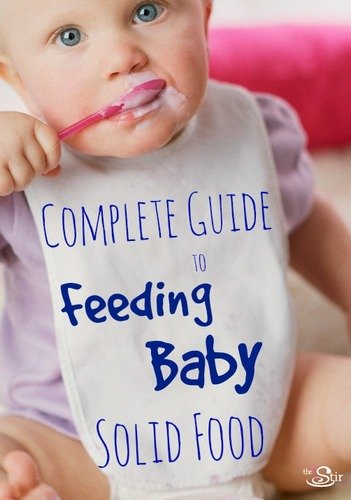Ever notice that you've just gotten a baby into a routine when everything changes? Welcome to parenthood, where nothing stays the same for more than a minute (OK, maybe two!). That includes your baby's eating routine. You've just got breastfeeding or bottle-feeding down to a science, and now it's time to start baby on solid foods. But when do you actually start baby on solids? And what should they eat? Is it fruits before veggies? Veggies before fruits? And what is this cereal everyone is talking about?
Your answer is here!
When to start:
This is the big question; isn't it? When to start? The American Academy of Pediatrics (AAP) recommends that moms breastfeed for the first 6 months of life, but they also suggest babies begin eating solids some time around 6 months.
So when, exactly, should you start?
"Most babies can start 'solids' between 4 to 6 months, depending on their readiness," says Danielle Fatemi, a pediatric dietitian with the Academy of Nutrition and Dietetics. "If your baby was born premature (less than 37 weeks at birth), you should wait until he or she is 4 to 6 months corrected age before introducing solid foods."
Is baby ready?
Most babies will actually tell us when they're ready to start solid foods, according to Dr. Wendy Sue Swanson, pediatrician at Seattle Children's Hospital and author of Mama Doc Medicine: Finding Calm and Confidence in Parenting, Child Health, and Work-Life Balance. But what should you be looking for?
"Lip smacking, watching parents eat, licking the air at meals, and having the ability to keep their head up beautifully and consistently and also being able to sit up for short periods of time," says Dr. Swanson.
"It's not recommended to ever start solids before age 4 months. And if your baby is growing well, exclusively breastfeeding, and not showing interest, there is certainly no rush!" she adds. "I love to encourage moms to really follow their baby and use baby-led feeding advances."
How to get started if you're formula feeding:
Formula-fed babies have different solid food needs from those who are breastfed, says Jill Castle, childhood nutrition expert and co-author of Fearless Feeding: How to Raise Healthy Eaters From High Chair to High School.
"Currently, the AAP supports either iron-fortified baby cereal or baby meat as a good first food for breastfed babies," Castle explains. "Babies who are formula-fed with iron-fortified formula don't have the critical need for iron sources from solid food because they get it in their formula."
So how do you start a formula-fed baby on solids? Here's Castle's step-by-step approach:
1. Begin with one feeding a day of thin, liquidy cereal, fruit, veggie, or meat (just a step up from formula or breast milk — use b-milk or formula to thin the solid food).
2. After a few days, add another feeding session and gradually up the texture (less liquid to the solid food).
2. Add a third feeding session — these can be spaced out like meals. The solid food feeding sessions can be offered between normal bottle feedings — they will be for exposure and learning rather than nutrition in the early days.
4. Mom will gradually offer more food at meal times as baby gets more accustomed to eating — this happens fairly quickly; it doesn't take baby very long to enjoy baby food.
How to get started if you're breastfeeding:
Life may be different for a formula-feeding mom and a breastfeeding mom in many ways, but not when it comes to solid food, says Fatemi.
"The guidelines are the same, with the exception of vitamin D supplementation and iron requirements," she explains. "By 1 week of life, exclusively breastfed infants should receive a vitamin D supplement of 400 IU per day (formula-fed babies can meet their vitamin D needs with formula). The [AAP] recommends that an iron supplement be started at 4 months for exclusively breastfed babies and continued until iron fortified solid foods are introduced."
What should baby eat first?
Your mom or your grandmother may have read you the riot act about feeding fruits before veggies or veggies before fruits, or maybe she's been pushing cereal before "real" food, but that's the old way of thinking, says Dr. Swanson.
"Although having foods rich in iron can be a priority for breastfed babies, there is no magic first food," Swanson explains. "Parents can start solid baby foods slowly and with whatever food they'd like! Most important is to ensure the consistency of first attempts are really liquid-like."
When to move past liquid foods and on to the "real" stuff

Making baby food can be time-consuming, and the cost of buying those little jars will weigh on you, but it doesn't last forever.
According to Castle, "By 8 to 10 months, mom [can] start to offer some table foods and start to get away from baby foods."
Castle recommends mashed banana or potato, avocado, small diced and soft-cooked veggies, soft fruit, and breads with spreads.
"The most important thing to remember is that baby sets the pace," she tells parents. "There's a lot of trial and error; baby food should only last a couple of months (four months tops) and move to family food gradually but try to be there by a year of age (with accommodations made based on feeding skills)."
Is your baby on solid food? How did you make the transition?
Image via Elsa Dunkel/Lumi Images/Corbis




